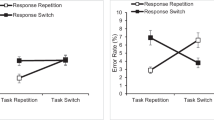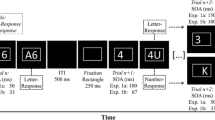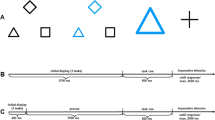Abstract
Ideomotor theory posits that actions are controlled by the anticipation of their effects. In line with this theoretical framework, response-contingent action effects have been shown to influence performance in choice-reaction time tasks, both in single-task and task-switching context. Using a task-switching paradigm, the present study investigated whether task-contingent action effects influenced N − 2 repetition costs in task switching. N − 2 repetition costs are thought to be related to task-switch costs, and reflect inhibitory control in task switching. It was expected that task-contingent action effects reduce between-task interference, leading to reduced N − 2 repetition costs. An experimental group (N = 24) performed eight blocks of trials with task-contingent action effects, followed by one block with non-contingent action effects; a control group (N = 24) performed nine blocks of trials with non-contingent action effects. In line with our expectations, a three-way interaction of group, block, and task sequence was obtained, indicating differential data patterns for the two groups: In error rates, the group who had received contingent action effects throughout blocks 1–8 showed larger N − 2 repetition costs in the random block 9 than in block 8, whereas the control group showed a reversed data pattern. The RT data pattern was in the same direction, although no significant three-way interaction was obtained. Taken together, we tentatively conclude that task-contingent action effects reduce task inhibition in task switching, and we outline directions for future research on the role of action effects in multitasking performance.


Similar content being viewed by others
Notes
We also conducted another experiment where the action effects were less salient. We applied a paradigm with face-categorization tasks, and the action effects were small changes in the face (e.g., eyes closing, person smiling, person looking to the left, etc.). We did not find any influence of action-effect contingency with that paradigm. Possibly the quite subtle changes of the visual stimuli led participants to ignore the action effects. We conjecture that action effects need to be salient in order be integrated into participants’ action plans. Details about this additional experiment are available on request.
The data pattern was similar when digit repetitions were included in the analysis.
References
Elsner, B., & Hommel, B. (2001). Effect anticipation and action control. Journal of Experimental Psychology: Human Perception and Performance, 27, 229–240.
Gade, M., & Koch, I. (2005). Linking inhibition to activation in the control of task sequences. Psychonomic Bulletin & Review, 12, 530–534.
Gade, M., & Koch, I. (2007). The influence of overlapping response sets on task inhibition. Memory & Cognition, 35, 603–609.
Gade, M., Schuch, S., Druey, M., & Koch, I. (2014). Inhibitory control in task switching. In J. Grange & G. Houghton (Eds.), Task switching and cognitive control (pp. 137–159). Oxford: Oxford University Press.
Grange, J. A., & Houghton, G. (Eds.). (2014). Task Switching and Cognitive Control. New York, NY: Oxford University Press.
Grange, J. A., Kowalczyk, A. W., & O’Loughlin, R. (2017). The effect of episodic retrieval on inhibition in task switching. Journal of Experimental Psychology: Human Perception & Performance, 43, 1568–1583.
Greenwald, A. G. (1972). On doing two things at once: Time sharing as a function of ideomotor compatibility. Journal of Experimental Psychology, 94, 52–57.
Hommel, B. (2009). Action control according to TEC (theory of event coding). Psychological Research Psychologische Forschung, 73, 512–526.
Hommel, B. (2015). The theory of event coding (TEC) as embodied-cognition. Frontiers in Psychology, 6, 1318.
Hommel, B., Müsseler, J., Aschersleben, G., & Prinz, W. (2001). The theory of event coding (TEC): A framework for perception and action planning. Behavioral and Brain Sciences, 24, 849–878.
James, W. (1890). The consciousness of self. The Principles of Psychology, 1, 291–401.
Janczyk, M., Heinemann, A., & Pfister, R. (2012). Instant attraction: Immediate action-effect bindings occur for both, stimulus- and goal-driven actions. Frontiers in Psychology, 3, 446.
Kiesel, A., & Hoffmann, J. (2004). Variable action effects: Response control by context-specific effect anticipation. Psychological Research Psychologische Forschung, 68, 155–162.
Kiesel, A., Steinhauser, M., Wendt, M., Falkenstein, M., Jost, K., Philipp, A., & Koch, I. (2010). Control and interference in task switching—A review. Psychological Bulletin, 136, 849–874.
Koch, I., & Allport, A. (2006). Cue-based preparation and stimulus-based priming of tasks in task switching. Memory & Cognition, 34, 433–444.
Koch, I., Gade, M., Schuch, S., & Philipp, A. M. (2010). The role of inhibition in task switching: A review. Psychonomic Bulletin & Review, 17, 1–14.
Kowalczyk, A. W., & Grange, J. A. (2017). Inhibition in task switching: The reliability of the n − 2 repetition cost. Quarterly Journal of Experimental Psychology, 70, 2419–2433.
Kunde, W. (2001). Response-effect compatibility in manual choice reaction tasks. Journal of Experimental Psychology: Human Perception and Performance, 27, 387–394.
Kunde, W., Koch, I., & Hoffmann, J. (2004). Anticipated action effects affect the selection, initiation, and execution of actions. Quarterly Journal of Experimental Psychology—A, 57, 87–106.
Lukas, S., Philipp, A. M., & Koch, I. (2013). The influence of action effects in task switching. Frontiers in Psychology, 3, 595. https://doi.org/10.3389/fpsyg.2012.00595.
Mayr, U., & Keele, S. W. (2000). Changing internal constraints on action: The role of backward inhibition. Journal of Experimental Psychology: General, 129, 4–26.
Monsell, S. (2003). Task switching. Trends in Cognitive Sciences, 7, 134–140.
Nattkemper, D., Ziessler, M., & Frensch, P. A. (2010). Binding in voluntary action control. Neuroscience & Biobehavioral Reviews, 34, 1092–1101.
Pettigrew, C., & Martin, R. C. (2016). The role of working memory capacity and interference resolution mechanisms in task switching. The Quarterly Journal of Experimental Psychology, 69, 1–43.
Pfister, R., Kiesel, A., & Melcher, T. (2010). Adaptive control of ideomotor effect anticipations. Acta Psychologica, 135, 316–322.
Prinz, W. (1997). Perception and action planning. European Journal of Cognitive Psychology, 9, 129–154.
Prinz, W., Aschersleben, G., & Koch, I. (2009). Cognition and action. In E. Morsella, J. A. Bargh & P. M. Gollwitzer (Eds.), Oxford handbook of human action (pp. 35–71). New York: Oxford University Press.
Rogers, R. D., & Monsell, S. (1995). Costs of a predictable switch between simple cognitive tasks. Journal of Experimental Psychology: General, 124, 207–231.
Ruge, H., Müller, S. C., & Braver, T. S. (2010). Anticipating the consequences of action: an fMRI study of intention-based task preparation. Psychophysiology, 47, 1019–1027.
Schuch, S., & Koch, I. (2003). The role of response selection for inhibition of task sets in task shifting. Journal of Experimental Psychology: Human Perception and Performance, 29, 92–105.
Shin, Y. K., Proctor, R. W., & Capaldi, E. J. (2010). A review of contemporary ideomotor theory. Psychological Bulletin, 136, 943–974.
Vandierendonck, A. (2017). A comparison of methods to combine speed and accuracy measures of performance: A rejoinder on the binning procedure. Behavior Research Methods, 49, 653–673.
Vandierendonck, A., Liefooghe, B., & Verbruggen, F. (2010). Task switching: Interplay of reconfiguration and interference control. Psychological Bulletin, 136, 601–626.
Waszak, F., Hommel, B., & Allport, A. (2003). Task-switching and long-term priming: Role of episodic stimulus-task bindings in task-shift costs. Cognitive Psychology, 46, 361–413.
Weaver, S. M., & Arrington, C. M. (2013). The effect of hierarchical task representation on task selection in voluntary task switching. Journal of Experimental Psychology: Learning, Memory, and Cognition, 39, 1128–1141.
Wolfensteller, U., & Ruge, H. (2011). On the timescale of stimulus-based action-effect learning. Quarterly Journal of Experimental Psychology, 64, 1273–1289.
Author information
Authors and Affiliations
Corresponding author
Ethics declarations
Conflict of interest
The authors declare that they have no conflict of interest. All procedures performed in studies involving human participants were in accordance with the ethical standards of the institutional and/or national research committee and with the 1964 Helsinki declaration and its later amendments or comparable ethical standards. Informed consent was obtained from all individual participants included in the study.
Funding
This research was supported by two grants within the Priority Program, SPP 1772 from the German Research Foundation (Deutsche Forschungsgemeinschaft, DFG): Stefanie Schuch was supported by Grant no. SCHU 3046/1-1. Angelika Sommer and Sarah Lukas were supported by Grant no. LU 2070/1-1.
Rights and permissions
About this article
Cite this article
Schuch, S., Sommer, A. & Lukas, S. Action control in task switching: do action effects modulate N − 2 repetition costs in task switching?. Psychological Research 82, 146–156 (2018). https://doi.org/10.1007/s00426-017-0946-7
Received:
Accepted:
Published:
Issue Date:
DOI: https://doi.org/10.1007/s00426-017-0946-7




